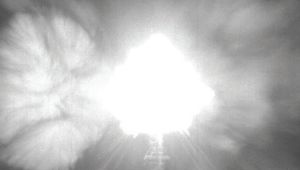The collapse earlier this month of the government's case against an alleged terrorist sleeper cell in Detroit is just another example of the Justice Department's failed "arrest by headlines" philosophy in the war on terror.
In Detroit, a federal judge dismissed the entire case against two men convicted of charges of materially supporting terrorism after allegations of prosecutorial misconduct suggested that the case against them had no merit. Evidence that bolstered the men's claims to innocence had been withheld from them by the prosecution team.
Fingers are pointing at the Justice Department, where Attorney General John Ashcroft is trying to put the whole mess on the malfeasance of a single attorney. That might work, but for the fact that this case has an all too familiar ring.
The Justice Department makes an arrest against a supposed terrorist, holds a press conference trumpeting its success in the war on terror and the media follows suit asking "are there enemies among us?" A few months later, the facts seem a little murkier, the accused enemies are innocent, and, yet, the cycle begins again.
Just ask the 1,800 men held after 9/11 on mere immigration charges and then released; or Brandon Mayfield, the Seattle lawyer falsely linked to the Madrid train bombings (he has never been to Spain); or the two mosque leaders in Albany who after being held for their supposed ties to terrorists (followed by a press conference by the No. 2 at the Justice Department) were recently released on bail after the judge determined that the FBI had mistranslated secret wiretaps.
Or, if you could, you might ask the men being held on Guantanamo Bay after being picked up in Afghanistan. After nearly three years, they have been convicted of nothing; the allegations against them have never been heard.
The patient British have even had enough. After two years, the United States finally released several British citizen detainees to British custody. The British government held them for a whole five hours until it determined that they were no threat.
Even cases that the government can call successful will hardly be footnotes in the annals of history. The six Yemeni-Americans who were present at al-Qaida training camps pled guilty to the charges, but not even the government argues they were an active cell. The conviction of attempted airline "shoe bomber" Richard Reid was hardly a challenge; a third grader could have made the case that the guy who was pinned down by vigilant airline passengers and taken from an airplane straight into custody should be locked up for life.
The facts regarding the Justice Department's record in the terrorism cases are significant and worth remembering when Ashcroft asks for more unnecessary powers and legal authorities to fight his war. But, the greater challenge is to determine why it is happening.
There are several plausible explanations:
The Not So Great Man Theory: Ashcroft is a singer, a politician, a devout Christian. He is not known as a great lawyer. An Attorney General sets the tone for the thousands of lawyers he oversees. He is also supposed to provide a check on overzealous prosecutors. Ashcroft has no such capability, as he takes the General in his title quite literally. It was he, afterall, who suggested in the days after 9/11 that a criticism of Bush only "gave comfort" to the enemies.
The We Screwed Up, but Won't Admit It Theory: Congressional investigation, media reports and ultimately the 9/11 Commission findings found that the Justice Department was, at best, remiss and, at worst, incompetent in the months before Sept. 11.
It failed to make connections and to listen to its agents and lawyers who appeared to have relevant information about Arab men using airlines. Ashcroft had even slashed the counterterrorism budget for his department on Sept. 10, viewing it as a lesser priority when measured against pornography and gun protection.
Public arrests look like a form of redemption.
The We're Not Dead Yet Theory: Agencies within the federal government are supposed to work together for a common cause. In reality, they vie for resources and attention. Since 9/11, we have been at "war," and that has meant that the Justice Department has had to prove its relevance. The best way to do that is through press conferences and promises of big arrests.
We're Lawyers Who Don't Like the Law Theory: Since the Bush administration began, the Justice Department has been filled with people better known for their ideology than for their legal skills. This would explain why lawyers for the department spent inordinate amounts of time trying to convince the president that "torture" wasn't really "torture" if done against really bad people. Someone can be accused of terrorism on weak facts because the law is so vague. What does it mean, for example, that someone "materially supports" terrorists? Training to do harm is one thing, but setting up an Internet site for a group that might be espousing radical ideas is not (nor did a jury think so).
The truth may lie somewhere among these theories. What we do know is that the tremendous amount of activity by the Justice Department has not made us any safer. It may be worse than that. Resources are limited, and it appears that most of them have been spent on cases that have had nothing to do with the real threat out there. Juliette Kayyem, a former member of the National Commission on Terrorism, teaches law and national security at the Kennedy School of Government. She served at the Justice Department from 1995-1999.
Kayyem, Juliette. “Prize Terror Suspects Are Being Set Free.” Newsday, September 12, 2004




